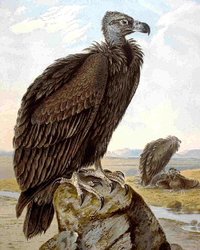Eurasian Black Vulture
|
|
| Eurasian Black Vulture Conservation status: Lower risk (nt) | ||||||||||||||
|---|---|---|---|---|---|---|---|---|---|---|---|---|---|---|
 | ||||||||||||||
| Scientific classification | ||||||||||||||
| ||||||||||||||
| Binomial name | ||||||||||||||
| Aegypius monachus (Linnaeus, 1766) |
The Eurasian Black Vulture (Aegypius monachus) is also known as the Monk Vulture the Cinereous Vulture, or just the Black Vulture. It is the only species in the genus Aegypius (Savigny, 1809).
It is a very large bird of prey in the family Accipitridae which also includes many other diurnal raptors such as kites, buzzards and harriers.
This bird is an Old World vulture, and is not related to the New World vultures which are in a separate family Cathartidae. It is therefore also unrelated to the American Black Vulture despite the similar name and coloration.
It breeds across southern Europe and Asia from Spain to Japan, but is endangered throughout its European range. It is resident except in those parts of its range where hard winters cause limited movement.
This species breeds in high mountains and large forests, nesting in trees. It has all dark plumage, and even at a distance can be distinguished from Griffon Vulture by its evenly broad "barn door" wings. It has the typical vulture "bald" head, and dark markings around the eye give it a menacing skull like appearance.
The Eurasian Black Vulture is usually larger than Griffon Vulture. Its more powerful bill is better suited to initially opening carcasses, and it takes priority over Griffons at corpses.
Template:Commonsbg:Черен лешояд de:Mönchsgeier he:עזניה שחורה nl:Monniksgier pl:Sęp kasztanowaty
